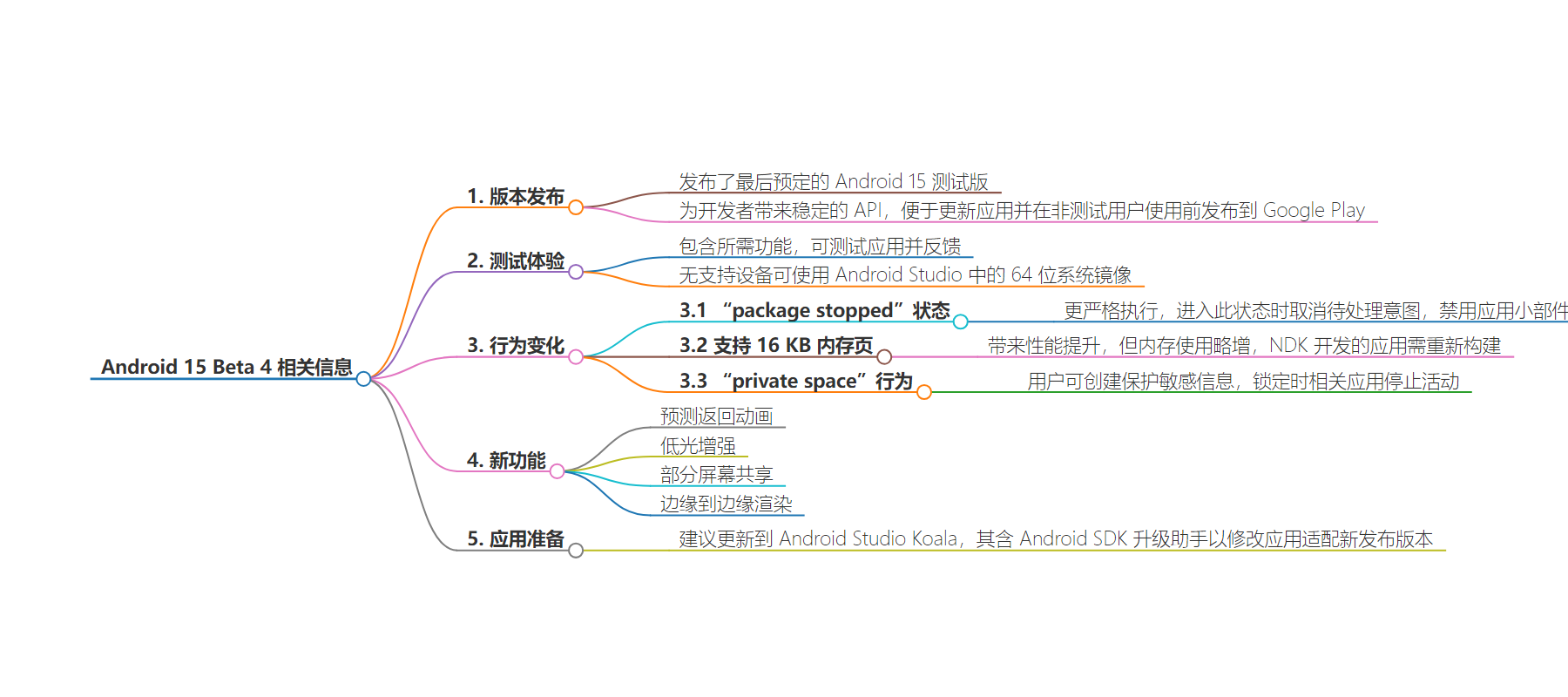包阅导读总结
1.
“`
Android 15、Beta 4、Developers、Apps、Update
“`
2.
Google 发布 Android 15 Beta 4,为开发者提供稳定 API 以更新应用。此版本有行为变化,如更严格的“package stopped”状态等。还引入新功能,如预测返回动画等。开发者可通过特定方式准备应用。
3.
– Android 15 Beta 4 发布
– 提供稳定开发者 API,开发者可更新应用并在非测试用户前于 Google Play 发布
– 可在支持设备或 Android Studio 模拟器中试用
– 行为变化
– “package stopped”状态更严格,相关操作受限
– 采用 16 KB 内存页,有性能提升但内存使用略增,原生代码应用需重建
– 新增“private space”,用户锁定时相关应用停止
– 新功能
– 预测返回动画等
– 应用准备
– 建议更新到 Android Studio Koala 及其包含的助手来修改应用
思维导图:
文章来源:infoq.com
作者:Sergio De Simone
发布时间:2024/8/15 0:00
语言:英文
总字数:444字
预计阅读时间:2分钟
评分:85分
标签:Android 15,应用程序开发,API 更新,性能改进,安全功能
以下为原文内容
本内容来源于用户推荐转载,旨在分享知识与观点,如有侵权请联系删除 联系邮箱 media@ilingban.com
Google has released the last scheduled Android 15 beta, which brings stable developer APIs and allows developers to update their apps and publish them on Google Play before non-beta users get access to the new Android version.
Today’s beta release has everything you need to try out Android 15 features, test your apps, and give us feedback. […] If you don’t have a supported device, you can use the 64-bit system images with the Android Emulator in Android Studio.
Besides API stabilization, Android 15 introduces several behavior changes that should explicitly be tested for. These include changes to the “package stopped” state, support for 16 KB memory pages, and a new “private space” behavior.
The “package stopped” state, meant to stop apps until the user interacts with them either directly by launching them or indirectly through a widget, is now enforced more strictly. This implies that when an app enters the stopped state any pending intents are canceled, and the app’s widgets are disabled by the system.
The adoption of 16 KB memory pages brings a few performance benefits, including lower app launch times while the system is under memory pressure, reduced power consumption during app launch, faster camera setup, and improved system boot time. This comes at the cost of a slightly higher memory usage. Most significantly for developers, all apps using native code through the Android NDK shall be rebuilt to be able to run on Android 15. Apps written entirely in Java or Kotlin are already compatible but should be tested anyway, says Google.
Private spaces are a new feature allowing users to create private spaces to protect sensitive information under an additional layer of authentication. When a user locks the private space, all apps in the private space are stopped, which means they cannot perform any foreground or background activities, including showing notifications. This affects all apps, but specifically medical and launcher apps, which require specific steps to ensure they deliver a satisfying user experience.
Android 15 also includes several new features, such as predictive back animations to help users understand what the outcome of a gesture will be and decide whether they want to carry it through; low light boost to improve camera recordings under low light conditions; partial screen sharing to share or record only an app window instead of the entire device display; edge-to-edge rendering, and more. The adoption of these new features is not strictly required.
To prepare your apps for Android 15, Google suggests updating to Android Studio Koala, which includes an Android SDK Upgrade Assistant to make it easier for developers to modify their apps so they will run correctly on the new release.
